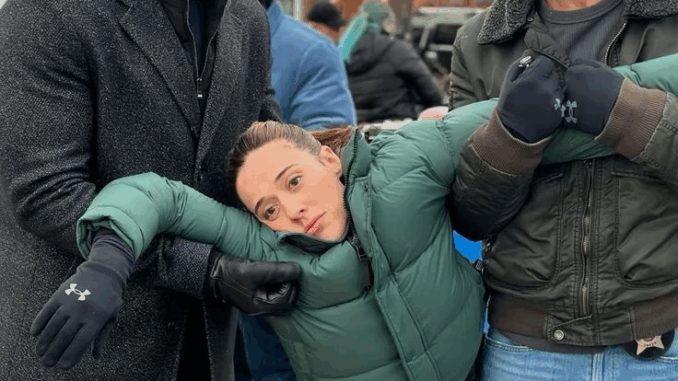
While Chicago P.D. thrives on onscreen conflict, what happened behind the cameras during Season 9 was even more explosive. The set, normally known for its tight-knit cast and professional crew, was shaken to its core when a bitter argument between two lead actors escalated into one of the show’s biggest internal crises to date.
According to multiple insiders, tensions had been building between Jason Beghe (Voight) and a newer co-star whose identity remains officially unconfirmed—though many believe it was related to a rising character competing for screen time. The tipping point came during a long night shoot involving a tense interrogation scene, where creative differences spilled into heated accusations, cursing, and, shockingly, a near-physical confrontation.
“It wasn’t scripted. Jason threw the chair—not in the scene, but in frustration. It was raw, it was real, and it was scary,” a crew member revealed anonymously.
Production was immediately halted for 48 hours.
But this wasn’t Jason Beghe’s first run-in with on-set controversy. Back in earlier seasons, he had already been under scrutiny for his aggressive tone and intense method acting, which reportedly made some co-stars uncomfortable. NBC had previously conducted internal reviews, and Beghe even released a public apology acknowledging past “anger issues.” But those issues, many believed, were behind him—until this incident reignited concerns.
Sources say producers rushed to contain the damage. An emergency meeting was called. Showrunner Gwen Sigan and Dick Wolf’s team were reportedly furious. For the first time, there were serious talks about writing Voight out permanently if another blow-up occurred. Beghe, realizing the gravity of the situation, issued a private apology and agreed to an off-camera cooling-off period.
The ripple effect was felt instantly. Scripts were rewritten to limit scenes between the two actors involved. One episode’s ending was changed entirely to avoid reshoots with both stars present. Fan-favorite plotlines were delayed or scrapped altogether.
But what really sent shockwaves through the Chicago P.D. fandom was the eerie silence from the cast on social media. Normally active and upbeat during press tours, interviews were abruptly canceled. Instagram posts dried up. And when the show returned after a brief hiatus, eagle-eyed fans noticed the cold tension in certain scenes that couldn’t be edited out.

“They were acting, sure,” said one viewer on Reddit. “But something about those scenes felt real. You could feel the resentment.”
While NBC and Wolf Entertainment never officially confirmed the altercation, whispers of the drama spread through crew members, extras, and entertainment blogs. For months, fans speculated: Was this why a major character was suddenly killed off? Why the tone of the season felt darker, more erratic?
Eventually, things calmed down. Professionalism won out. But the emotional scar lingered, and so did the underlying question: Can a show built on loyalty survive when its own cast fractures?
As of now, Beghe remains on the series, and his character Voight is more complex—and volatile—than ever. Some speculate that writers even incorporated the real-life tension into his storyline, turning Voight darker, colder, and more unpredictable.
Ironically, that chaos made the show even better.
Still, the fallout from that night changed Chicago P.D. forever. What once was a united front behind the scenes now operates with quiet caution. And fans, more than ever, are watching closely—both on the screen and off it.
Because in Chicago P.D., the real drama doesn’t always end when the cameras stop rolling.